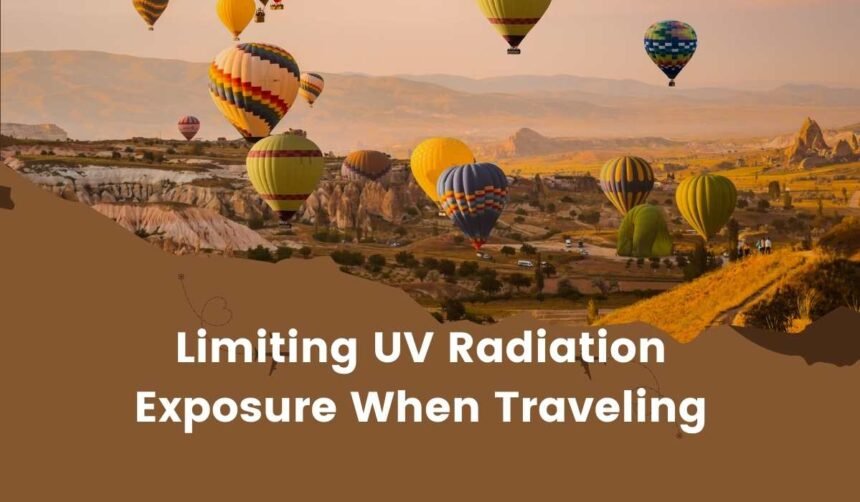Limiting UV Radiation Exposure When Traveling: Traveling to new and exciting destinations can be a thrilling experience, but you still need to prioritize your health, particularly when it comes to sun exposure. Ultraviolet (UV) radiation from the sun can harm your skin, ranging from sunburn to long-term damage.
The Dangers of UV Radiation Exposure
The sun emits three types of UV radiation — UVA, UVB, and UVC. While the atmosphere blocks UVC, UVA and UVB can get through and affect the skin. Prolonged UV exposure can lead to sunburn, premature aging, and an increased risk of skin cancer.
UV exposure over time increases the risk of skin cancers, including melanoma, the deadliest form. Unfortunately, skin cancer is shockingly common, as research shows that 20% of people will be diagnosed by the age of 70.
Additionally, prolonged exposure can compromise the skin’s natural defenses, weakening the immune system. You must adopt sun-safe practices and prioritize your health to mitigate these risks.
7 Tips for Limiting UV Radiation Exposure
Before you set off on your outdoor adventures or relax in the sunshine, remember to prioritize sun safety and protect your skin from its harmful effects. Whether heading to the beach, hitting the slopes or sightseeing in the sun, keep these tips in mind to keep your skin healthy.
1. Choose the Right Sunscreen
Selecting an appropriate sunscreen is the best way to protect your skin from UV radiation. Look for a broad-spectrum product with a sun protection factor (SPF) of at least 30 to block out 97% of the sun’s rays. Apply it generously to all exposed skin, including areas you may neglect, like ears, neck, hands, and the top of your feet. Remember to reapply every two hours or more frequently if you’ve been swimming or sweating.
Don’t let a cloudy or cold day fool you. Many people stop applying sunblock as soon as the weather cools and the sun hides behind clouds. Even in cold weather and snow, the sun’s harmful rays can damage your skin. Snow reflects UV radiation, increasing the risk of sunburn. Applying sunscreen on exposed skin, even on overcast days, is essential. If you’re bundled up in layers, your face will likely still be exposed. Apply a gentler sunblock to your face every morning for extra protection.
2. Wear Suitable Clothing
Wearing the proper clothing can be an effective barrier against UV Radiation Exposure. Opt for loose-fitting, long-sleeved shirts and pants to cover as much skin as possible. Darker colors and tightly woven fabrics provide better protection, shielding your skin from the sun. Remember to add a wide-brimmed hat or cap and a pair of sunglasses if you’ll be out and about all day.
3. Stay in the Shade
UV rays are generally the strongest between 10 a.m. and 4 p.m. If possible, plan your outdoor excursions for the early morning or late afternoon when UV Radiation Exposure is less intense. When in doubt, find shade under trees or umbrellas to give your skin a break from direct sunlight.
4. Stay Hydrated
Proper hydration is essential for overall health and can also keep your skin moisturized. Drinking enough water helps your skin stay hydrated, making it more resilient to sun exposure.
When traveling, you may spend a lot more time outdoors and on your feet, so remember to increase your fluid intake to keep up with your adventures. If water gets boring, switch to electrolytes or coconut water, which is extremely hydrating and offers potential anti-aging and anticarcinogenic benefits, making it a refreshing choice.
5. Don’t Neglect Your Lips and Eyes
Apply a lip balm or lipstick with SPF to shield your lips from sun damage, especially in high-altitude or warmer climates.
UV radiation can also harm your eyes, leading to conditions like cataracts and macular degeneration. Invest in a pair of sunglasses that block UVA and UVB rays. Look for pairs with a “100% UV protection” label to protect your eyes.
6. Avoid Tanning Beds
If you’re jet-setting somewhere tropical, you may be tempted to get a nice bronze glow beforehand. Tanning beds emit similar UV radiation to the sun, increasing your risk of skin cancer by 47% and speeding up aging. Go for a spray tan or do a self-tan at home instead.
7. Check the UV Index
Stay informed about your location’s UV index. It indicates the strength of UV Radiation Exposure and helps you gauge your needed level of protection. Experts recommend staying indoors or in the shade when the UV index is 8 or higher, as your skin can burn within minutes. You can use the weather app on your phone for regular checks.
Stay Sun Safe
While you may be preoccupied exploring new destinations, it’s still crucial to prioritize your skin’s health by limiting sun exposure. Simple precautions, like choosing the right sunscreen and seeking shade during peak hours, can make a significant difference in preventing sun damage and skin cancers.
Author Bio
Jack Shaw is the senior writer for Modded, a men’s lifestyle publication. An avid outdoorsman and lover of travel, he’ll often find himself taking retreats out into nature to explore the world and encourage others to do the same.





